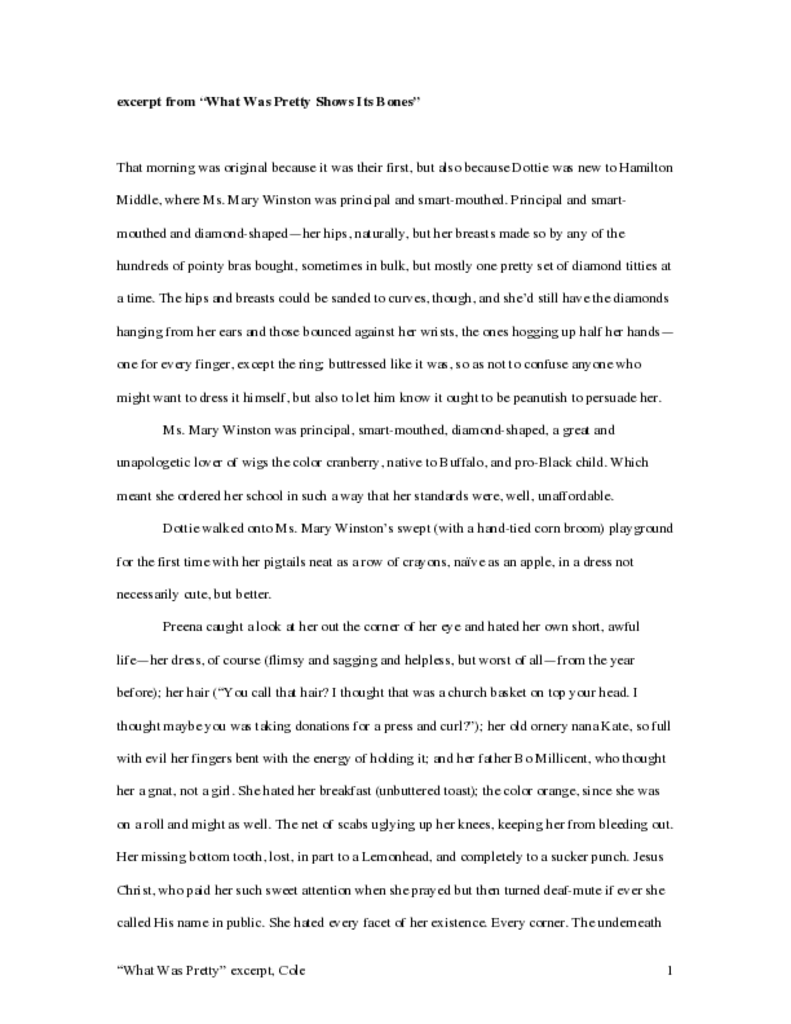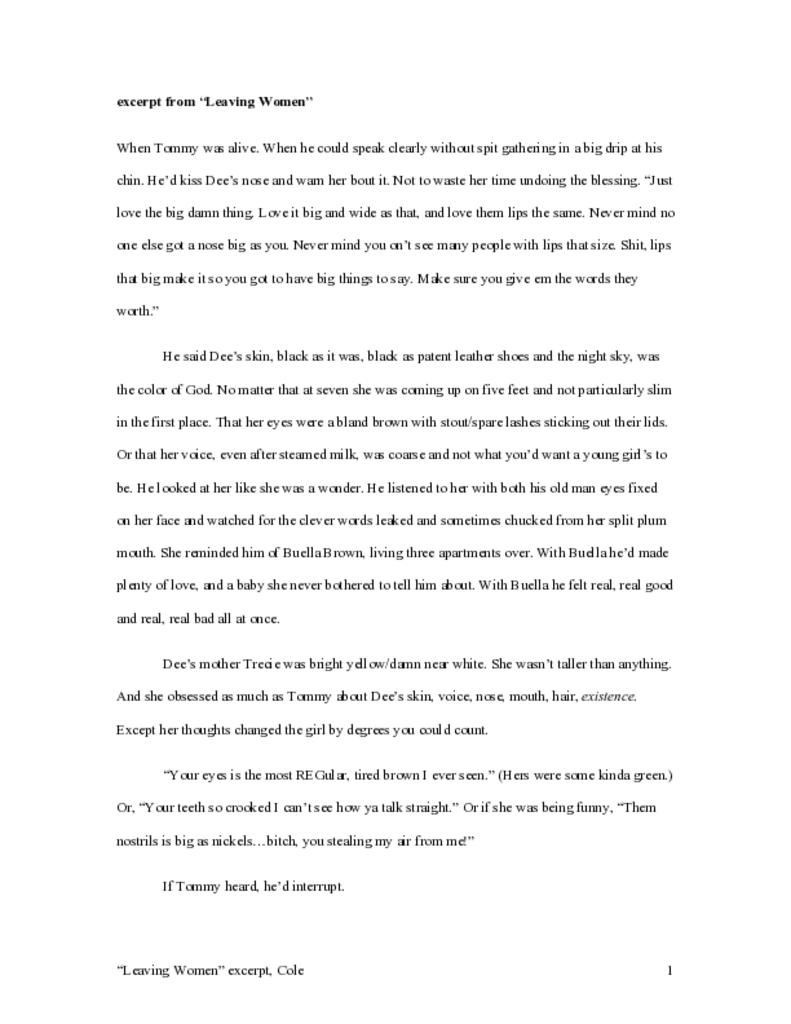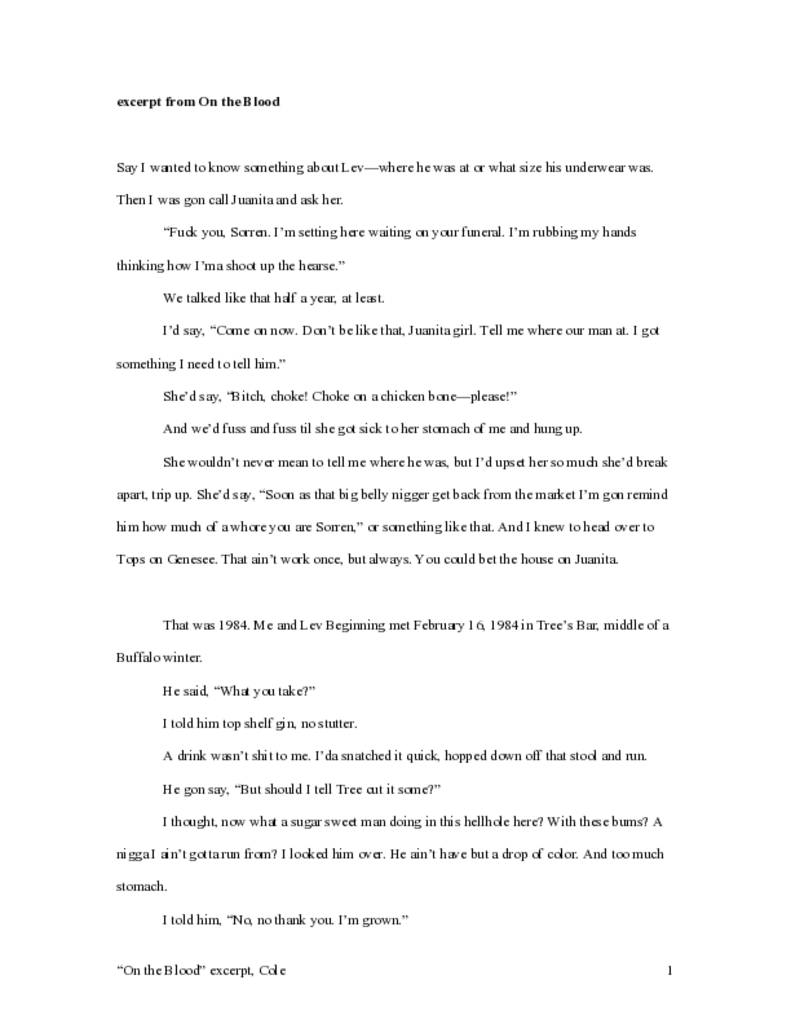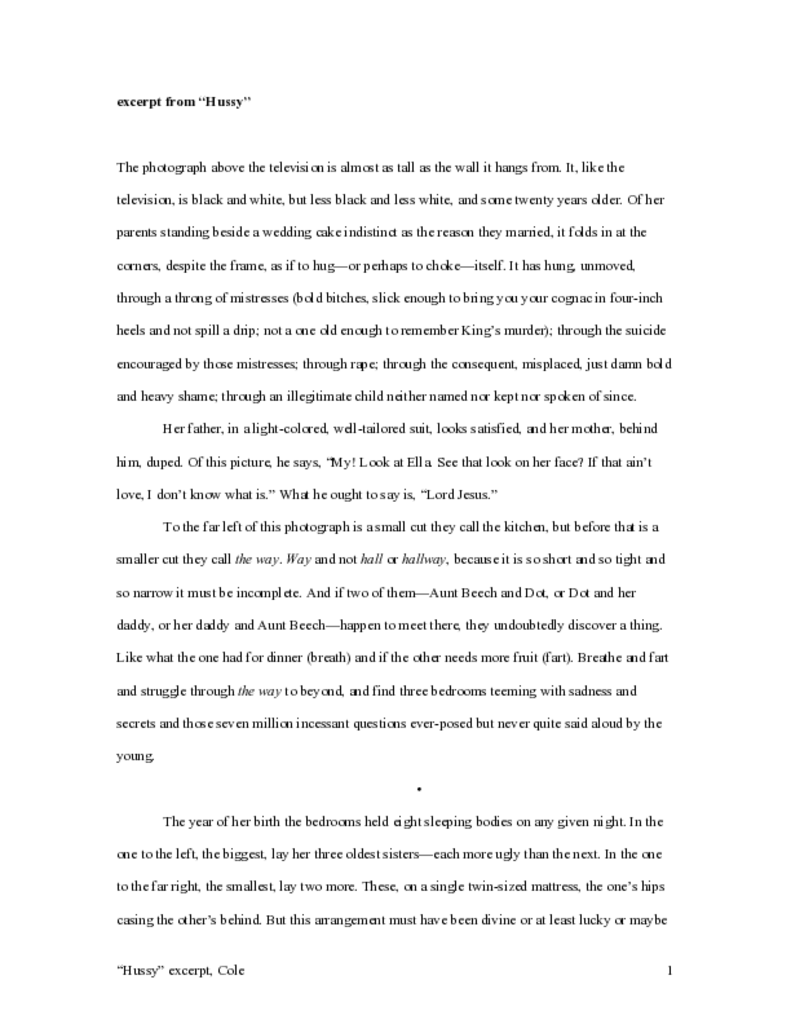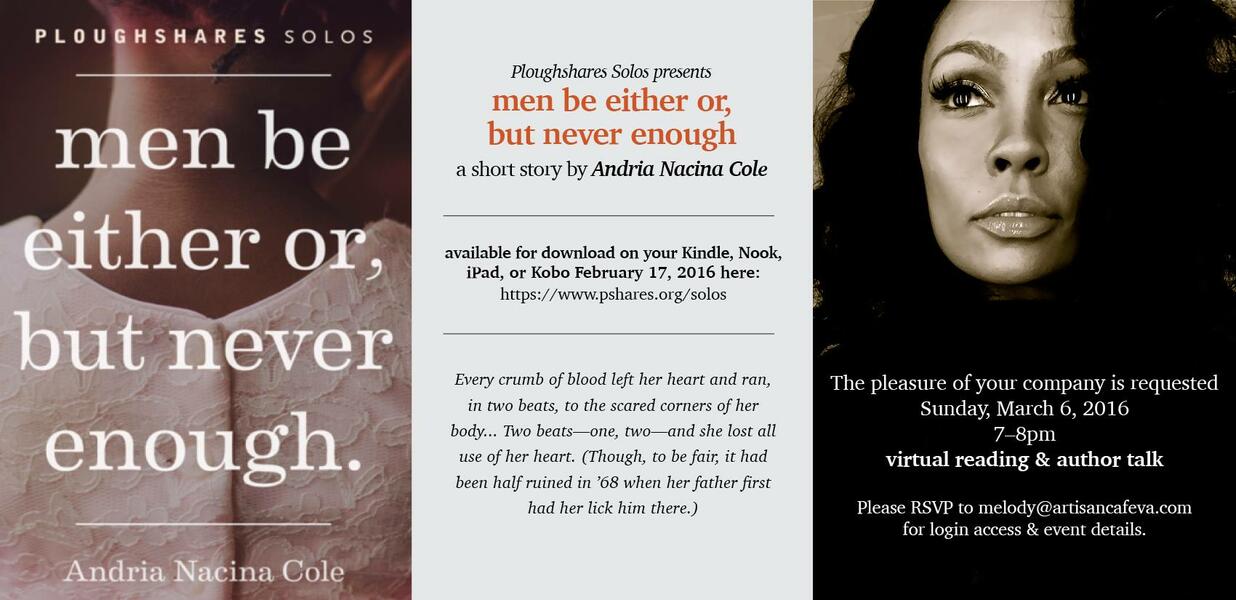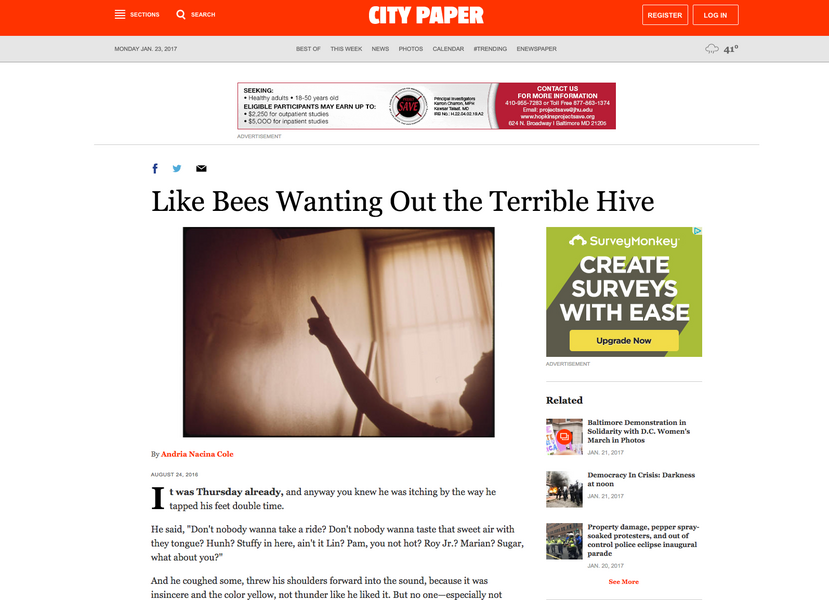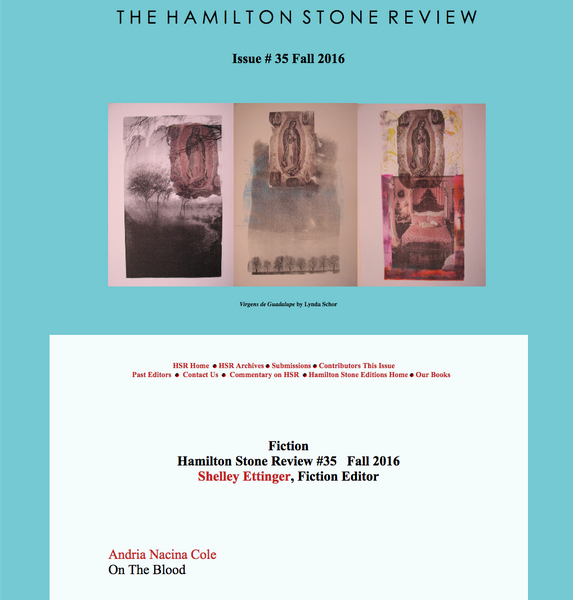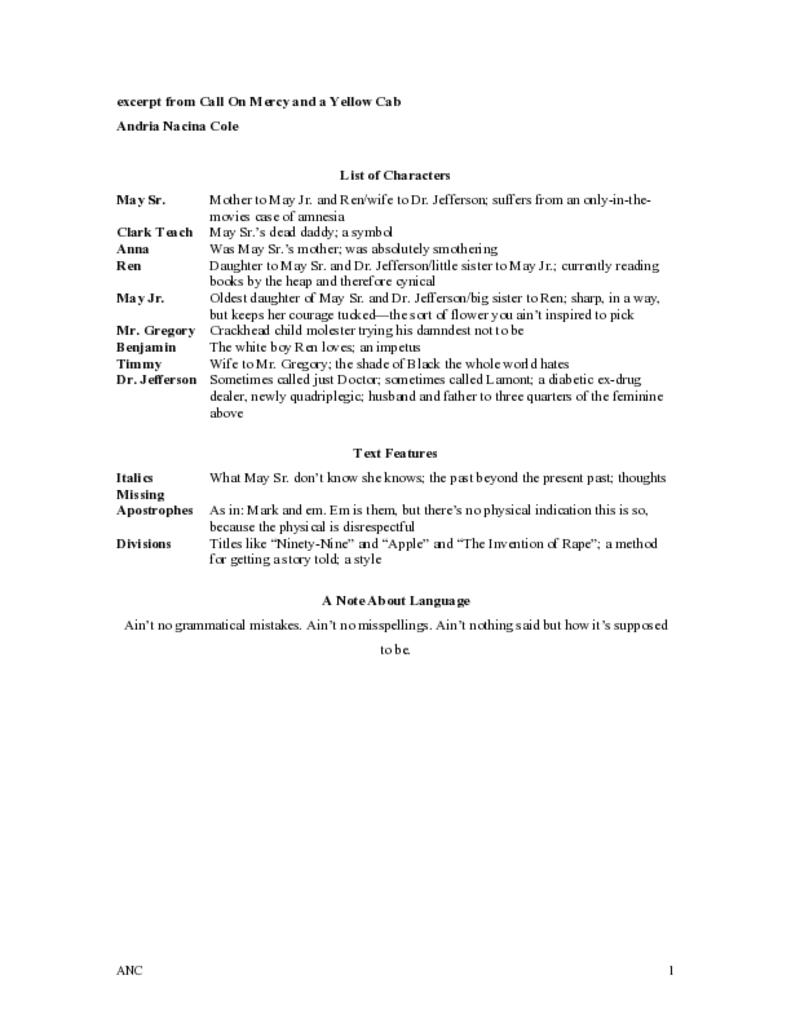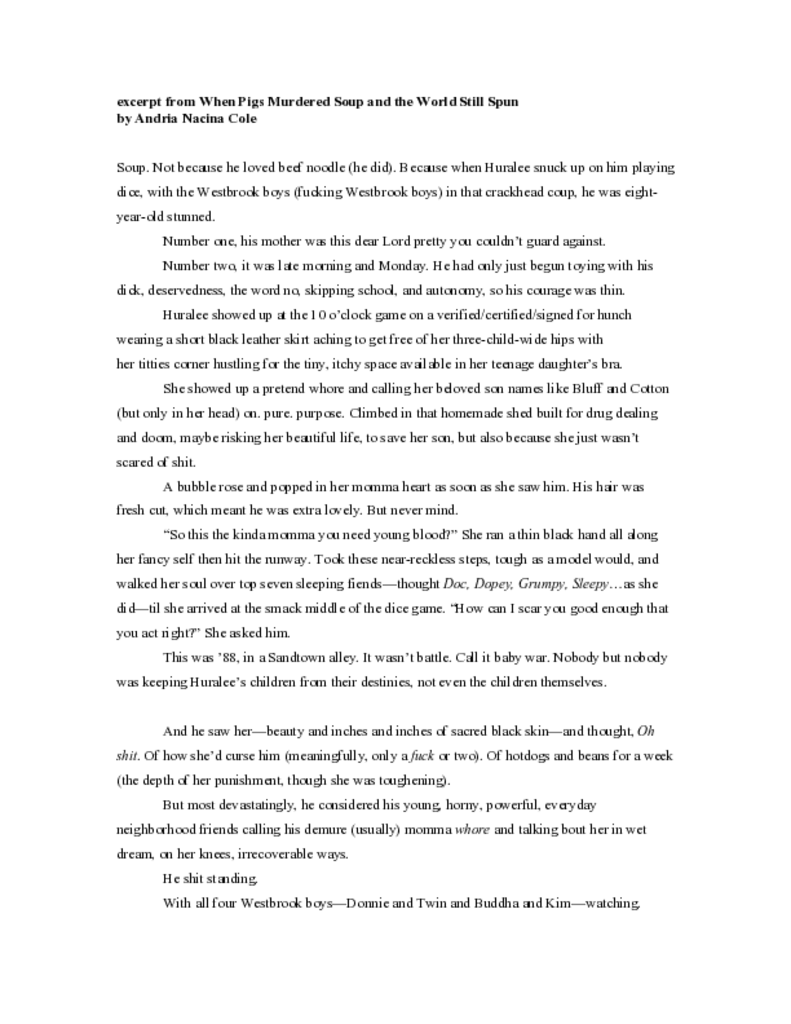Work samples
-
What Was Pretty Shows Its Bones"And the best kinda pencils were nice, but the fact remained that if Dottie was going to make it at Hamilton Middle with Ms. Mary Winston for principal, mean and diamond-shaped as she was, with all those ghetto children keen on keeping track—of who wore what, of who said this, of everything and nothing at all—she needed to learn a few things. Quick." This excerpt is from the short story "What Was Pretty Shows Its Bones." It explores a deep-love friendship between two little girls. It also explores tragedy.
-
Hussy"She’s suffocating in her momma’s wedding dress to lose her virginity, then. Since it should be spectacular." This is an excerpt of the short story "Hussy." Young Dot has been given a story to live, but it isn't hers and so she rejects it. Her rebellion and upbringing, coupled with the unbearable burden of patriarchy mix to nearly ruin her.
About Andria
Baltimore City

Andria Nacina Cole read The Color Purple in the 9th grade. There was no one to tell. She read Beloved in 11th. Shared the glamour and devastation of it with a chemistry professor. He nodded when her eyes got wide, but also when she cried. So again, there was no one to tell. She did not read Sonia Sanchez until college, and Gayl Jones? She was 35 before she knew her. Also, along the way were: June Jordan, Lucille Clifton, bell hooks, Audre Lorde, Edwidge Danticat, Ntozake Shange, Zadie Smith,… more
Jump to a project:
The King of Love is Dead
Had to be, I guess, 2002, 2003? My good girlfriend (I'm peanut butter, she's jelly) told me a story way too big to handle on your feet. A sit you down story. The I was different after that kind. It was a story that wasn't supposed to be. It was about her going to the park with an adult she loved, loved—loved the hairs escaping the bun on top of her head, I mean. Loved her stomach—never mind the stretch marks, its folds, its being squishy…as a matter of fact, she loved it precisely because it was marked and folding and so soft. She loved the veins leaping through the backs of her legs, the corns hugging three quarters of her toes. She loved anything she could run her fingers passed, and the stuff she couldn't even see—the pitch and angle and sometimes depth of her grainy-like-sugar voice. This was a most important love is what I mean, and the story was about going to the park with that love, love, and meeting another woman and the children who loved, loved her there. It was about the grown ups staying back to gossip and philosophizes about why their men weren’t acting right, and maybe when the kids weren't looking, to take a little puff of the roach tucked between one of their titties and a bra. It was about the grown ups staying back and the kids running off to play. And I could listen to those parts all right. I could hear all that just fine. And even the part about one of the boys trying his luck and touching her where he ain’t have no business touching. I could stand that, because she was right there with me and I knew she had survived. But my heart started to climb at the part after her panties were torn. When she ran on top of her little girl stick legs to stand before the women—the one she loved, loved, and the other—and show them what the little boy had done. My heart was inching through my throat come the part where her love, love told her, “Shut up! That boy ain’t touch you.” It was up in my head by the time she said the woman whose baby hair she adored, whose stomach and veins and corns she'd have gladly kissed and thanked the heavens for, made her apologize. "For making up that lie." “Apologize to that boy and his momma. And get on out my face.” She told me that and my heart was sitting like a chicken on its eggs in my spinning head. So I wrote her story, then. My hope being to undo some of the hurt earned/kept when you run on top of your young and wobbling stick legs to tell the love of your life how you were harmed, and rather than blow something up, rather than even take your hand and run like the devil out of there, she turns her head and pulls on the weed. My good girlfriend’s story and all the others in The King of Love is Dead speak to sexual assault. It is a collection of work about women and girls who are on the verge of extinction. Six of its nine stories have been published or accepted for publication. The remaining three are just almost there; after a few tweaks I'll send them off. Once I have published all nine stories individually, I hope to find a publisher who will bind them forever.
Call on Mercy and a Yellow Cab
I thought Call On Mercy and a Yellow Cab would be a work of flash fiction. It started as a response to the Tobias Wolff short story, “Say Yes”, in which a woman discovers that she does not know her husband as well as she thought. He reveals that he would not have married her if she were Black. I think the story is lovely, but I also think it never had to be. In general, Black women do not entertain the idea of marrying white men. When they do, it is a radical act. I finished the story and thought, That marriage ended over an unreal thing. And was inspired to play around with those two ideas—what if a Black girl, straight out of the ghetto, fell in love with a white boy? And what if I wrote about unreal things? Before I knew it (well, not really—the expansion required damn hard work), I had written fifty pages, with two hundred more ripping through my head. The novel is ambitious and explores too many dark things—Dr. Lamont Jefferson, for instance, is a drug kingpin, made so by his own mother. Mr. Gregory is a pedophile. May Sr. suffers from an only-in-the movies case of amnesia, essentially forgetting her children. Hopefully the writing manages the awfulness. Hopefully the stories are not a melodramatic mess, but rather a sensitive and qualified glance at marginalized lives.
-
Writers and Words ReadingAndria Nacina Cole reading from Call on Mercy and a Yellow Cab at the Writers and Words reading series.
-
Mercy_detailed_BakerArtist.pdf"But Black people, all people, get meaner and meaner the further down the color line you trip. Should you be near white, passing, tragically passing, light-skinned, urine-colored, summer red, winter red, brown-skinned with a yellow shining/hollering beneath, God bless you. Timmy, though, was so Black she was blue. Piano-colored, at least. Coming up on midnight, minimum. And somehow, Mr. Gregory Smith, way back in ’82, figured he could love her." Call on Mercy and a Yellow Cab, a novel.
Memphis and Haddassah and Barbara and Keisha and Pip (Or How Tony Learned to Stay Young)
Memphis and Haddassah and Barbara and Keisha and Pip (Or How Tony Learned to Stay Young) is a collection of short stories that examines and honors the inner lives of Black men. I gave birth to a boy child four years ago and my world tilted. Suddenly, Black men were holding permanent court in my tender places. I mean I had loved them—in a guarded way—all my life. I had kissed them, danced with them, cooked for them, slept with them, carried their babies. I’d dreamt with and for them. I’d hated them some, too. They’d been outright abusive at times, silencing and ignoring me, walking out of my life without so much as a nod, a whistle. So I made it my business to pat, pat their backs when we hugged; to tell them secrets, but not the best kinds—you know, keep them at an arm’s length, on the bottom shelf. Maybe because I felt like they did things to me and maybe for me, but not ever really with me. I had never witnessed the kind of blood and guts vulnerability I needed, so I could be defenseless in return. But then you push a boy child out from between you…and you take up the work. This collection gathers the experiences of Black men and reveres them. Not by pretending their lives are fragile or by sitting them on some pedestal or by pointing out only what is lovely and divine about them, but by conveying them authentically and excellently. It takes them off the shelf. They deserve literature.
Sometimes I have to remind myself why I’m crafting a collection of short stories dedicated to Black men. The most readily available souvenier is my own Black son. Baby Suggs, from Toni Morrison’s Beloved, said, “A man ain’t nothing but a man, but a son? Now that’s somebody.” I decided to write this collection following the uprising. I was intent on honoring Black men in literature. Their stories have been so grossly mishandled and I wanted to put a lotta sugar and honey and care into them. Almost place them on pedestals, just to even shit out a bit. But then Korryn Gaines was murdered, and I was haunted by what I thought was a lack of support by Black men. I did a little Facebook experiment where I literally clicked on 100 Black male profiles, to see how many of them—my Facebook buddies—had posted in solidarity, in protest, in support. Only two even mentioned Korryn and both of them condoned her murder. Now mind you, when a Black man’s murder by police goes viral, Black women roll up our sleeves and get to work. We organize the rallies, we lead the political response, we write the think pieces, we manage the Go Fund Me pages. So, in that moment—after my little bootleg experiment—to be faced with the realization that I was using my precious, precious writing time—I am a mother of two, I work full time, I run a business, Lord knows I try to call myself exercising—to write about folk who quite likely would not return the favor…I was more than discouraged. I threw a damn fit. I said things like, “Fuck them. I’ma write about little Black girls and beautiful Black women like I always have.”
But I was already three stories in. And baby they were too damn good to scrap. So there’s that. But then there’s what I discover about Black men in the process. There’s my son. There’s the mighty and humbling task of doing the right thing just because you should.
In Another Country, Jimmy Baldwin said, “Women don’t see men the way men want to be seen. They see all the tender places, all the places where blood could flow.” And so of course, ultimately, this collection is a conversation with myself. It’s a working out of my shit, my issues, my problems with Black men. It is a glorious spiritual journey I’m so excited to take.
Sometimes I have to remind myself why I’m crafting a collection of short stories dedicated to Black men. The most readily available souvenier is my own Black son. Baby Suggs, from Toni Morrison’s Beloved, said, “A man ain’t nothing but a man, but a son? Now that’s somebody.” I decided to write this collection following the uprising. I was intent on honoring Black men in literature. Their stories have been so grossly mishandled and I wanted to put a lotta sugar and honey and care into them. Almost place them on pedestals, just to even shit out a bit. But then Korryn Gaines was murdered, and I was haunted by what I thought was a lack of support by Black men. I did a little Facebook experiment where I literally clicked on 100 Black male profiles, to see how many of them—my Facebook buddies—had posted in solidarity, in protest, in support. Only two even mentioned Korryn and both of them condoned her murder. Now mind you, when a Black man’s murder by police goes viral, Black women roll up our sleeves and get to work. We organize the rallies, we lead the political response, we write the think pieces, we manage the Go Fund Me pages. So, in that moment—after my little bootleg experiment—to be faced with the realization that I was using my precious, precious writing time—I am a mother of two, I work full time, I run a business, Lord knows I try to call myself exercising—to write about folk who quite likely would not return the favor…I was more than discouraged. I threw a damn fit. I said things like, “Fuck them. I’ma write about little Black girls and beautiful Black women like I always have.”
But I was already three stories in. And baby they were too damn good to scrap. So there’s that. But then there’s what I discover about Black men in the process. There’s my son. There’s the mighty and humbling task of doing the right thing just because you should.
In Another Country, Jimmy Baldwin said, “Women don’t see men the way men want to be seen. They see all the tender places, all the places where blood could flow.” And so of course, ultimately, this collection is a conversation with myself. It’s a working out of my shit, my issues, my problems with Black men. It is a glorious spiritual journey I’m so excited to take.
-
Rubys ReceptionAndria Nacina Cole speaking about her collection Memphis and Haddassah and Barbara and Keisha and Pip (Or, How Tony Learned to Stay Young) at the 2016 Rubys Artist Awards reception.
-
Pigs_detailed_BakerArtist.pdf"In the first place the Black Panther Party had been hung by its Black Power neck. Never mind they’d shot the all mighty King of Love straight through his loving heart and he was already dead twelve and a half years. Then you figure Malcolm and Medgar, the Kennedys, those four little girls, that circle-faced grinning Emmett Till were mere Black liberation ghosts that couldn’t be conjured by Jesus or voodoo, no matter the cognac, no matter the prayer." "When Pigs Murdered Soup and the World Still Spun", a short story about the murder of a young boy by Baltimore police.
92
92 follows a plain-faced girl with a body so built it can’t be looked at and not ached for. But she demanded it. Bullied God for it. “Not this face. Uh uh. Not this dry face AND itty bitty titties.” It ends up a terrible bargain. She can’t wield its power and her mother’s dead by page 50, can’t help a bit with the taming. Dear Claudine is a murderous woman obsessed with color. She tries poisoning Nan’s father Boogie, but mishandles things. Boogie is so black it thrills Claudine to touch him, but he is also her sister Sym’s one and only love, and so she is always torn between fucking and maiming him. Nan witnesses all this on top of discovering what nastiness her body brings and is almost suffocated. The novel is about beauty that requires a dim light, sex too soon, a color-struck woman, a man who waits 92 days for proof he’s dead, and sisterhood so strong it thrives under betrayal. The audience can expect to struggle and to be present. It is a big work with big ideas requiring a big system to see it through. The final product will be a 300-some page novel. Currently, I’ve managed 275+. I am energized by the idea of being done with it.
